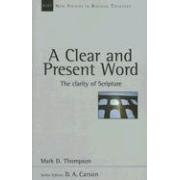 Of all the classic doctrines under assault in our day, the one that is most often questioned by the most number of people with the most far reaching implications has to be the doctrine of the perspicuity of Scripture. Simply put, the perspicuity of Scripture means that the essential teachings of the Bible are clear and accessible. The main things are the plain things, and the plain things are the main things.
Of all the classic doctrines under assault in our day, the one that is most often questioned by the most number of people with the most far reaching implications has to be the doctrine of the perspicuity of Scripture. Simply put, the perspicuity of Scripture means that the essential teachings of the Bible are clear and accessible. The main things are the plain things, and the plain things are the main things.Sadly, perspicuity has fallen on hard times. In my “dialogue” with emergents I have found the one recurring theme to be their claim that there is not a “plain sense” of the text, that Scripture has been interpreted a thousand different ways and does not lend itself to one correct, ascertainable meaning. Non-Christians too are quick to point out: “People use the Bible to say all sorts of things. You’re just giving me your interpretation.” The meaning of Scripture, it is argued (or just plain assumed), is anything but clear.
In light of these (and many other) objections, I commend to you Mark Thompson’s excellent work A Clear and Present Word: The Clarity of Scripture (part of the New Studies in Biblical Theology series edited by D.A. Carson). Thompson, Academic Dean and lecturer in theology and church history at Moore Theological College in Sydney, Australia, has written a clear and accessible book on, well, the clarity and accessibility of Scripture. The issues he covers are so important that I’m going to take the time to blog through the book’s five chapters over the next five days.
*****
Chapter one, entitled “Oh sweet obscurity: The absurdity of claiming clarity today”, begins by noting five traditional objections to the doctrine of the clarity of Scripture. I’ve encountered every single one of these objections several times over the past few years. You can find them in any number of popular Christian books and probably from many of your friends.
1. “The doctrine fails to take account of the transcendent mystery that is the subject of Scripture.” Erasmus charged Luther with reducing God to a series of doctrinal assertions, arguing that human language cannot adequately express the reality of God. God is bigger than any propositions about him. The best we can say about God is that we can't really say anything about God.
2. “The doctrine fails to acknowledge the God-given role of the church as the interpreter of Scripture.” For the Catholics, this means “it takes a Magisterium.” For the postmodern, it means “it takes a community.”
3. “The doctrine fails to take seriously the nature of the word of Scripture.” In other words, the Bible is a human book, written in human words, translated by fallible men. The claim of clarity doesn’t do justice to just how human this book really is.
4. “The doctrine fails in practice given the reality of diverse interpretations.” Historically, Christians have been all over the map in their interpretations of Scripture. So how clear can it really be?
5. “The doctrine fails by its own criterion, since Scripture confesses its own obscurity.” Aren’t we claiming more for the Bible than it claims for itself when we argue for its perspicuity?
Thompson explains that these five traditional objections have only been magnified by postmodern philosophy. “Modern epistemology”–where, it is argued, we thought we could adequately apprehend reality by objective reason–has been thoroughly discredited. No one comes to the text with a blank slate. We never hear God straight up. We always read through our own situation, culture, and finitude. As James K.A. Smith puts it, “Even when someone purports to deliver to us the unadorned voice of God, or ‘what God meant’, we always receive only someone’s interpretation, which is wearing the badge of divinity.”
Thus, we don’t have authoritative “this is right, that is wrong” interpretations, only “interpretative communities." Granted, many postmoderns acknowledge that this does not mean every text has a limitless number of interpretations, but at the same time there is certainly no single plain meaning. The bottom line, we are told, is that today's Christian ought to have the humility and honesty to admit that the meaning of Scripture is not as clear or readily understandable as Christians once thought.
These are not frivolous arguments. We don’t do ourselves or our opponents any favors when we think we can dismiss out of hand postmodern epistemology just because it comes with the word postmodern. Serious people (and some not so serious) are making serious arguments (and some silly arguments too) against the clarity of Scripture.
In the days ahead I’ll unpack Thompson’s response to these objections. But just so I don’t leave you thinking all hope is lost for the perspicuity of Scripture, let me finish with a quote from J.B. Webster that leads off the book.
We can cloak our own darkness by calling it the obscurity of the text; we can evade the judgment which Scripture announces by endless hermeneutical deferral; we can treat Scripture not as the clear Word of judgment and hope but as a further opportunity for the imagination to be puzzled, stimulated and set to work...That is why the promise of claritas scripturae is inseparable from the prayer: ‘Open my eyes, that I may behold wondrous things out of thy law’ (Ps. 119:18).










2 comments:
Did I miss something?
I guess I was not alone since the seemingly insane comment was deleted.
Post a Comment